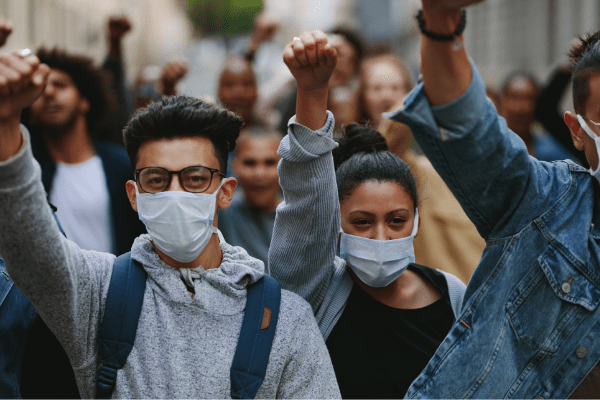Eight out of 10 young people claim they know nothing or very little about their country’s climate policy.
That’s according to new research by gender equality charity Plan International Australia following a survey of more than 1,800 people aged between 15 and 24 across thirty-seven countries.
The report found that 84 percent of respondents say their government’s efforts to include them in policies to fight the climate emergency is inadequate, with a tiny 6 percent believing it is ‘about right.’
Almost every respondent said they were concerned about the climate emergency, with three quarters citing they felt very or extremely worried.
Most respondents were students or had already finished high school or tertiary education. Over 80 percent of respondents say they have taken action due to their fears about climate change.
Plan International Australia CEO, Susanne Legena, believes that the report shows the concern young people have about their future on this planet, and suggests that educating girls will be one of the most urgent solutions.
“Young people are fearful for their future and want to shape the policies and decisions that will define them, but often don’t feel informed or empowered enough to do so,” she said in a statement. “This exposes significant shortfalls in how children and girls are learning about the environmental crisis we face.”
“Educated girls become the leaders our planet needs. Educating girls is one of the most powerful solutions to creating a climate-just world. It has the ability to amplify all other solutions to climate change, and yet it continues to be overlooked by our global leaders and decision makers. How can we solve the world’s greatest crisis, but ignore the most powerful solution?”
“Governments worldwide must give young people, including and especially girls in their diversity, a greater say in how to tackle the climate emergency. When the world invests in girls’ education, we can unravel the practices and structures that are damaging our planet. We can unlock girls’ creativity, their power, their resilience and their leadership. Educated girls lift us all.”
The report found that the most common form of action taken by respondents was educating other people about climate issues, signing a petition, and taking to social media to post about climate change.
Only one in five had joined a protest or strike, and just over one in five had been taught about climate policies. About one in five assessed their climate change education as poor or very poor, while just 11 percent had been taught how to participate in climate decision-making processes. Fewer than one in ten respondents say they have participated in climate policy processes.
Girls and young women were more likely to say they don’t feel confident participating in climate policy processes (29 percent), compared to boys and young men (20 percent).
Youth Activist Harleen, one of Plan International Australia’s ambassadors believes that not enough practical action plans are given to young people about how to tackle climate change.
“Education about climate change does not provide any practical action plans on how anxious and worried youth can make effective, long-lasting changes,” she said in a statement.
“We, as the next generation, are being failed by not being equipped with the right resources to tackle the not-so-far away climate crisis- an existential crisis that is detrimental to not just youth, but all. The government needs to acknowledge there is a climate emergency and implement the very basis of nuanced education around this matter for more knowledgeable and sanguine students.”
Over two days beginning July 28th, Global Partnership for Education (GPE) Replenishment Summit and COP26 conference will take place in a hybrid format, with participants attending live sessions on a virtual platform with a small in-person event in London, travel restrictions permitted. U.K Prime Minister Boris Johnson and Kenyan President Uhuru Kenyatta will co-host the summit.
A week from the Summit, Plan International is calling on governments worldwide to improve school teaching on the climate emergency, including placing greater emphasis on the social, political and human rights dimensions of the crisis.
It is also calling for more funding for girls’ education in the most climate exposed countries, including $5 billion at the GPE summit and through the Green Climate Fund.
In November, the U.K government will be hosting the COP26 summit, which organisers hope will be a key opportunity for meaningful engagement among young people.
Youth Activist Harleen stresses the importance of including First Nations and Indigenous people into these conversations.
“While everyone is affected by the consequences of climate change, Indigenous people are at the forefront of the climate crisis,” she said. “Their deep connection to land and their ancestral heritage with the country will be diminished due to the rise of sea levels, increasing temperatures and relocation of communities from coastal areas.”
“The lack of intersectionality and consideration for marginalised communities when it comes to discourse about climate change is a problem that needs to be solved as First Nations peoples customs, preparation and implementation for managing the land is essential for tackling the climate crisis.”


